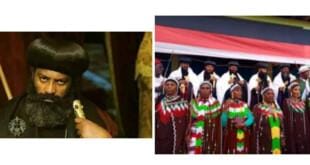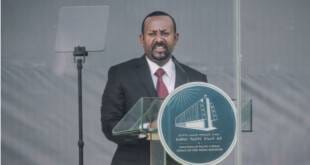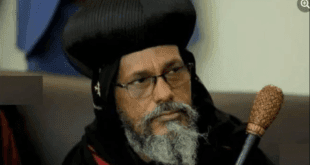As has been expected since President Putin on 17 May ordered Russian military forces to “immediately move” from Local War to Regional War operational status and to be “fully prepared” to expand to Large-Scale War should either the US or EU enter into the Syrian Civil War, the Ministry of Foreign Affairs (MFA) is reporting today that thousands of Russian troops have been deployed in “full war mode” and that Israel is now a “major likely target” too.
According to this report, the “surprise alert exercise” Defense Minister Sergei Shoigu ordered last Thursday (24 May) for the Southern Military District involving four regiments of S-300 air defense systems troops combining 8,700 personnel, 185 warplanes and 240 armored vehicles are now positioned to enter into the Syrian War Zone“within hours” to begin offensive and defensive operations.
Even worse, this report continues, Foreign Intelligence Service (SVR) troops have likewise been ordered into the Syrian War Zone, including the much feared Zaslon Special Forces units, in order to prepare for the widening of this conflict into what could turn into World War III.
According to all global military experts, this report says, Russia’s Zaslon Special Forces are “so shadowy they make ninjas look like amateurs” and their introduction into this conflict has shifted the balance of power to the point where the European Union (EU) lifted their long standing arms embargo for the radical Islamic rebels (who just hours ago pleaded with the West for immediate weapons shipments) and US President Obama ordered his military commanders to quickly give him a no-fly plan for Syria.
Even though Russia slammed the EU’s plan to arm these Islamic rebels, it also stated that it will not cancel plans to deliver its advanced S-300 air-defence system to Syria despite Western opposition, thus enraging Israel which earlier today threatened an attack on Russian forces attempting to move them into the conflict zone.
To how truly grim the situation has become for the Sunni-Western backed Islamic rebels attempting to overthrow the Assad regime was noted earlier today by a senior Israeli officer interviewed by the Debka File Intelligence News Service who put all these forebodings into words when he said: “A military and strategic catastrophe for the West and Israel is in full flight in Syria, and no one in Washington or Jerusalem is lifting a finger. Israel’s government and military heads never imagined that the Syrian war would take this turn. But we had better wake up at this eleventh hour – before it is too late.”
As we had previously reported about this conflict, the true intentions of this war are being kept from the Western peoples who mistakenly believe it is about “freedom and democracy,” but is, instead, a strategic plan to capture Syria, destroy its Shiite leadership, and then use its territory to build a massive natural gas pipeline from the Gulf States to the EU thus destroying Russia’s stranglehold on European energy supplies.
Qatar, which has the world’s biggest gasfield, has been working since 2009 to build their proposed pipeline through Syria to Turkey and has, in fact, turned the Syrian War into its own conflict, and as we can, in part, read as reported by the Financial Times News Service:
“In the shell-blasted areas of rebel-held Syria, few appear to be aware of the vast sums that Qatar has contributed – estimated by rebel and diplomatic sources to be about $1bn, but put by people close to the Qatar government at as much as $3bn.
However, a perception is taking root among growing numbers of Syrians that Qatar is using its financial muscle to develop networks of loyalty among rebels and set the stage for influence in a post-Assad era. “Qatar has a lot of money and buys everything with money, and it can put its fingerprints on it,” says a rebel officer from the northern province of Idlib interviewed by the FT.”
Also being kept from the Western peoples about this conflict are Russia’s true intentions and aims, and which were recently articulated by Fiona Hill who is senior fellow at the Brookings Institution and who said:
“…this is a prism that [Putin] brought to looking at most conflicts like the conflict in Syria that threaten the sanctity of a state. Mr. Putin actually came in to the presidency, if you can recall, back in ’99-2000 in Russia, just as the second war in Chechnya was starting off. And he saw that as his biggest challenge of keeping the Russian state together, so it didn’t fall down the same path as the Soviet Union into collapse. And Putin was really brutal in pursuing the war in Chechnya. Hundreds of thousands of people were killed in the whole course of the conflict, including many civilians.
The capital city of Grozny in Chechnya was reduced completely to rubble, and Putin thought this was worthwhile because it kept the state together. And over the course of the conflict in Chechnya it morphed in the same way that we’ve actually seen in the war in Syria. It went from a conflict that was mostly focused on political secession from, Chechnya from the Russian Federation, and over time, really took on more of an extremist element, more of Sunni extremist groups who moved in to exploit the conflict and also many people who came from outside, including from Syria, to fight in Chechnya.
And Putin is now pretty much concerned that we’re going to see a repetition, the collapse of the state in Syria, knock-on effect for conflicts at home for him as well as more broadly across the whole of the Middle East. And yet again, another collapse of the state, that is something that he would like to see avoided at all costs.
…these all add to Mr. Putin’s interest in Syria itself, but his overwhelming fear is of the collapse of the state. In addition, in fact, to the two elements that you’ve mentioned in terms of weapon sales and also access to this naval facility at Tartus, there’s also a quite sizeable Russian population, 30,000 people roughly, people who are married to Syrians. There’s also a Russian Orthodox Church interest in the Christian communities inside of Syria. And also, Assad did help Putin in the case of Chechnya.
He prevented a number of groups who were supporting the Chechens, including from a broader ethnic group in Syria that originated in the Russian North Caucasus from collecting money and sending recruits there. But overall, the biggest concern for Putin, having seen what happened in Libya with the fall of Gadhafi and the chaos that’s originated there, as he looks across the rest of the Middle East, he looks at Iraq, he looks at the prospects of Afghanistan after the U.S. withdrawal, he looks at what’s happening in Egypt and across North Africa now, Putin thinks this is just going to be yet another state collapse that’s going to have very negative knock-on effects for Russia, that has also, from his point of view, been battling with extremism now for several decades.
…it seems that their biggest concern is of the chemical weapons falling into the hands of the opposition, not that they would be actually used by Assad himself. Of course at this particular point, given what seems to be the inevitable collapse of the state structures, this has ratcheted to the top of our agenda, and I think we should be really pushing the Russians on what then they determine to do if there is evidence – there’s already been speculation about the use of chemical weapons, but if there is evidence there that chemical weapons have been used by either side.”
As Russia has moved its naval fleets into the Mediterranean to warn the West and Israel not to intervene in Syria’s bloody civil war, and as it prepares to send its most advanced S-300 missiles to protect the Assad regime from “hotheads” intent on intervention, there appears to be no letup in Western capitols as the push for all-out war from these bankster elites continues unabated.
Source; whatdoesitmean




